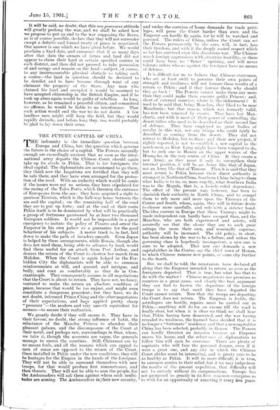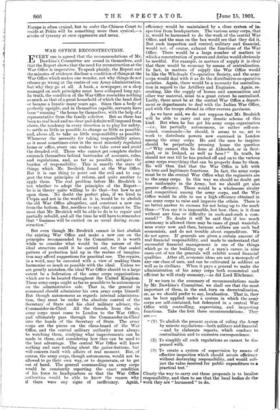THE FUTURE CAPITAL OF CHINA. T HE indemnity is the immediate
question between Europe and China, but the question which governs the future is the choice of a, capital. The Powers naturally enough are exceedingly anxious that as soon as the inter- national army departs the Chinese Court should again take up its abode in Pekin. That is for foreigners the ideal capital. The diplomatists are accustomed to go there, they think now the Legations are fortified that they will be safe there, and they have even arranged for the protec- tion of the road. With an audacity which would be comic if the issues were not so serious, they have stipulated for the razing of the Taku Forts, which threaten the entrance of Europeans from the sea ; they have acquired a right to garrison Tientsin, which is the half-way house between the sea and the capital ; on the remaining half of the road they are to put up forts ; and at the end of their route Pekin itself is to be dominated by what will be practically a group of . fortresses garrisoned by at least two thousand European soldiers. It would not be impossible in a great emergency to imitate the policy of Pizarro and arrest the Emperor in his own palace as a guarantee for the good behaviour of his subjects. A motor track is, in fact, laid down to make the path . of invaders smooth. Even Japan is helped by these arrangements, while Russia., though she does not need them, being able to advance by land, would find them useful for an attack from Port Arthur, and desires the return of the Court to shorten her march from Mukden. When the Court is again lodged in the For- bidden City the diplomatists will be able to summon reinforcements at will, and quarrel, and intrigue, and bully, and coax as comfortably as they do in Con- stantinople. They consequently assume in all negotiations that the Court is about to return. They have not, we fancy, ventured to make the return an absolute condition of peace, because that would be too unjust, and might even constitute a dangerous precedent ; but they have, we do not doubt, informed Prince Ching and the other negotiators of their expectations, and have applied pretty sharp "pressure "—the modern and very smooth equivalent for menace—to secure their realisation.
We greatly doubt if they will secure it. They have in their favour, no doubt, the strong influence of habit, the reluctance of the Manchu Princes to abandon their pleasant palaces, and the discomposure of the -Court at their novel, and perhaps raw, surroundings in Sian, where, we take it, though the accounts are vague, the generals manage to coerce the courtiers. Still, Chinamen are by no means fools, and all the reasons which can appeal to men of sense are opposed to the return of the Court. Once installed in Pekin under the new conditions, they will be hostages for the Empire in the hands of the foreigner. They will not be able to surround themselves with new troops, for that would produce first remenstrauce, and then-threats. They will not be able to arm the people, for the Ambassadors will ask them against Whom such multi- tudes are arming. The Ambassadors in:their new security, and under the coercion of home demands for trade privi- leges, will press the Court harder than ever, and the Emperor can hardly fly again, for lie will be watched and pursued. The rulers of China, unless the Court can set the Powers permanently by the ears, will, in fact, lose their freedom, and with it the deeply rooted respect which so far has survived even this disastrous war. The Chinese watch foreign aggressions with attentive hostility, or there could. have been no " Boxer" uprising, and will never tolerate rulers who as against the foreigner have no means of defence.
• It is difficult for us to believe that Chinese statesmen, who are at least swift to perceive their own points of strength and weakness, will not foresee these results of a return to Pekin ; and if they foresee them, why should they go back ? The Powers cannot make them any more than they could make them execute guilty Princes ; • and, short of external coercion, where is the inducement ? It used to be said that, lain, Manchus, they liked to be near Manchuria ; but that reason, which was formerly valid, has now been removed by events. They have lost Man- churia, and with it most of their power of controlling the desert tribes who used to be described as their second line of defence. They have employed no great bodies of cavalry in this war, nor any troops who could fairly be described as coining from the desert. They did not retreat to Mukden, but to Sian : and their new project, if rightly reported, is not to establish a new capital to the north-west, as Men Lung might have been tempted to do, but to seek one in Honan on the upper waters of the Hoang-ho, in the very centre of China. If they create a new Army, as they must if only to strengthen _their internal position, it will be an Army like that of Japan, not an Army like that of Timour. Then it is said that they must return to Pekin because their direct authority • is strongest in Northern China, Southern China being to them what India is to us, or, more exactly, what Southern India was to the Moguls, that is, a loosely ruled dependend. The effect of the present war, however, has been to diminish their authority in North China, and to compel them to rely more and more upon the Viceroys of the Centre and South, whom, again, they will in future desire to choose more carefully, and rule with a stricter hand. The idea, current in Europe that these Viceroys might be made independent can hardly have escaped Sian, and the Manchus, who are both experienced and astute, will assuredly see that the closer they are to such c.,,reat satraps the more their own, and nominally supreme, authority will be increased. The old policy, iii short, has been shown by the war to be a failure, and unless the governing class is hopelessly incompetent, a new one is sure to be adopted. That new ono demands a new capital either in the Centre, say the chi4 town of Honan, to which Chinese rumour now points, or some city further to the South.
But, we shall be told, the negotiators have declared all along that the Emperor intended- to return as soon as the foreigners departed. That is true, but what has that to do with the matter ? Chinese negotiators use promises as counters in a great game, and clearly the best argument they can find to hasten the departure of the foreign troops is to say that until they have departed the Court cannot return. Now that the troops are departing the Court does not return. The Empress is feeble, the astrologers are hostile, repairs must be carried out in Pekin,—anything will do for an excuse till the road is finally clear, but when it is clear we think we shall hear that, Pekin having been desecrated, and the war having revealed its weakness, the learned have decided that it is no longer a "fortunate" residence, and that a newca,pit al for China has been selected, probably in Holm. The Powers can hardly threaten an invasion because an Emperor moves his house, and the reluctance of diplomatists to follow hint will soon be overcome. There are plenty of aspirants who will face the personal danger, even if it were a great one, and any city in which the Chinese Court abides must be interesting, and is pretty sure to be as healthy as Pekin. It will be more difficult, it is true, to summon armies to their relief, but if we may judge from the results of the present expedition, that difficulty will not be entirely without its compensations. Europe' has not-prospered so greatly in its first common enterprise as to wish for an opportunity of renewing it every five years. -Europe is often cynical, but to order the Chinese Court to reside at Pekin will be something more than cynical,—a stroke of tyranny at once oppressive and mean.











































 Previous page
Previous page